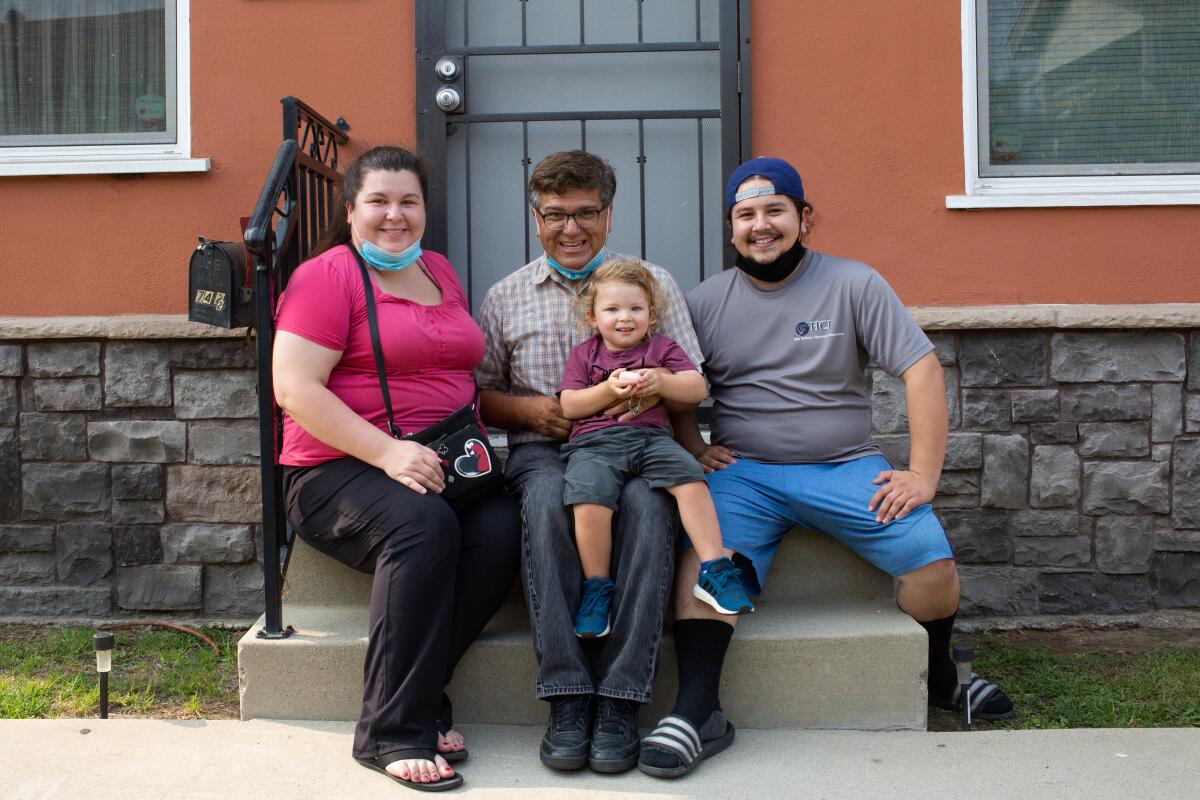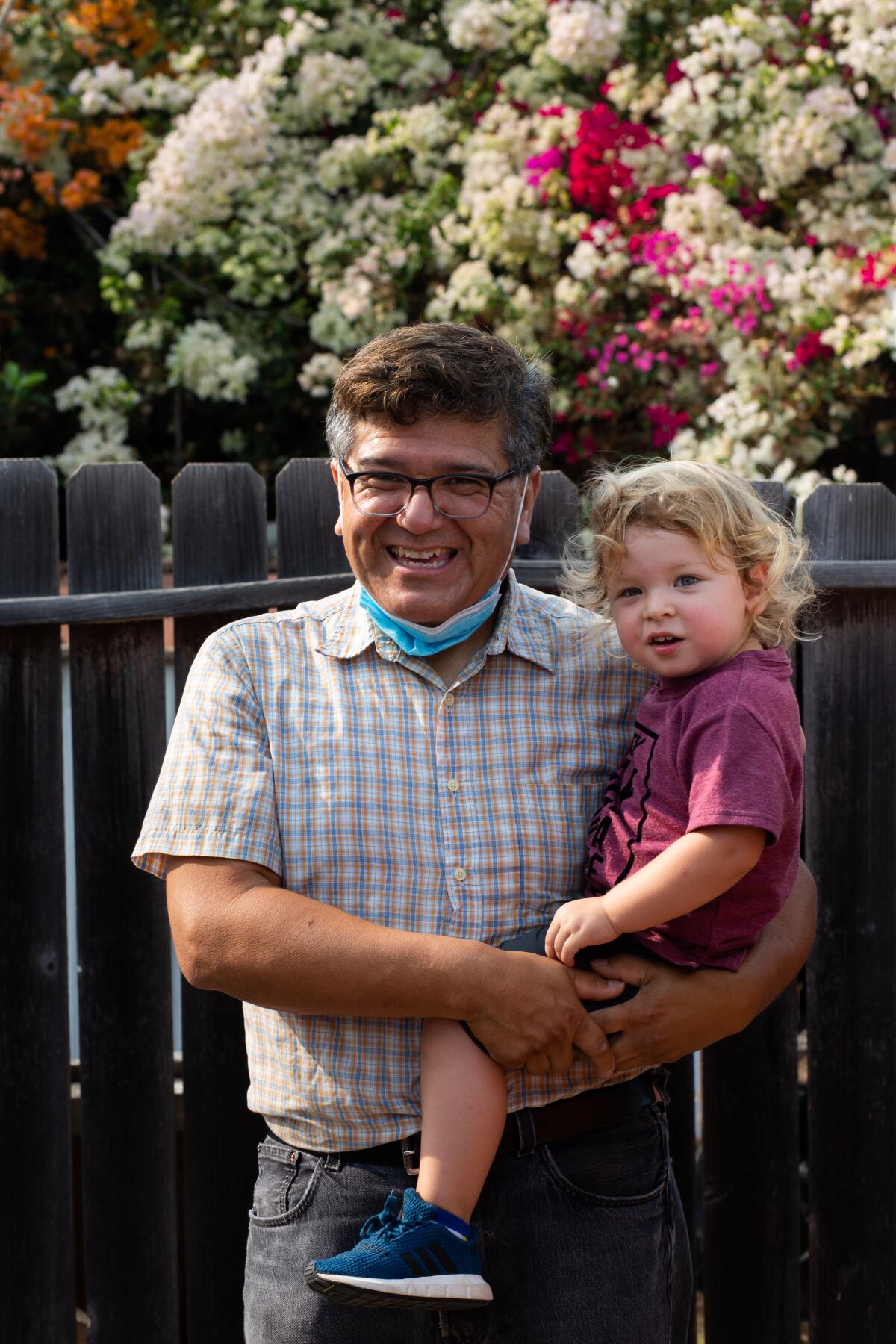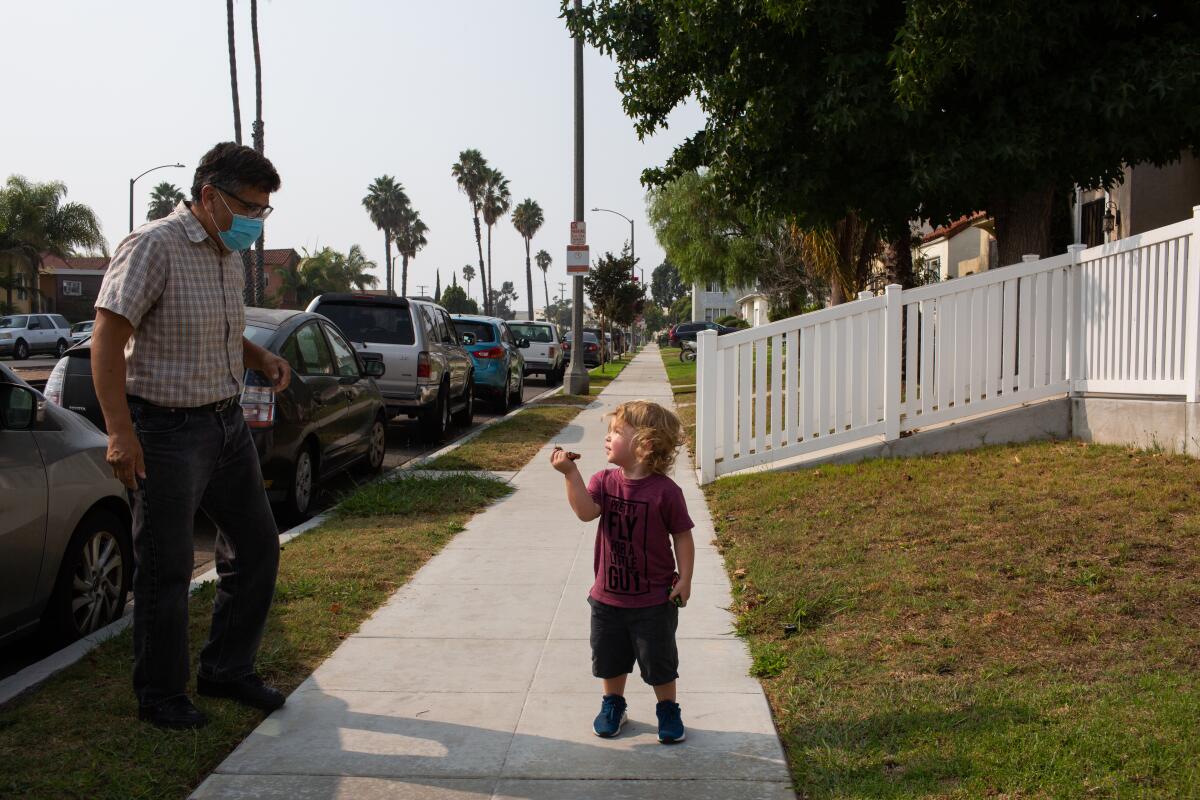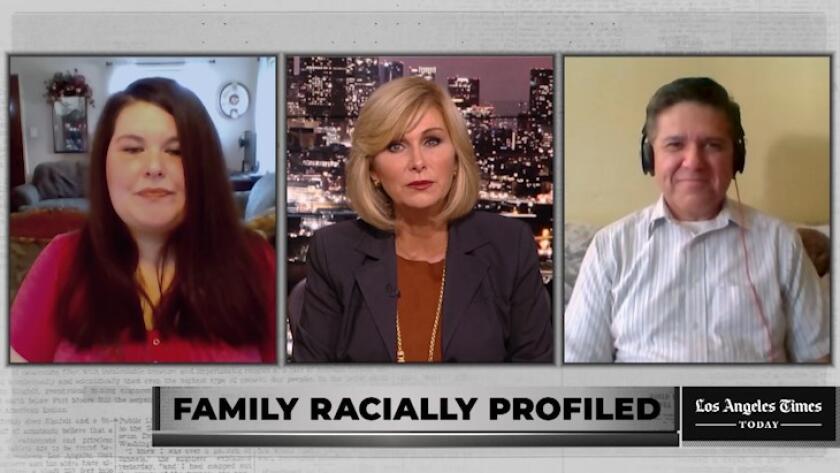A 911 caller said a Latino man was kidnapping a white child. The toddler was his grandson

- Share via
Police vehicles surrounded Abel Mata on a sunny afternoon outside his Torrance home. Officers wanted to know the identity of the child he’d been holding moments before.
A neighbor had called 911 to report that a Latino man had kidnapped a white baby.
A stunned Mata was forced to explain: The child was his grandson. Mata’s daughter, Athena, had dropped 2-year-old Milo off for babysitting, as she did routinely, and the boy was inside the house with his grandmother.
As Mata and the officers walked toward the door, a blond woman came out of a neighboring apartment and approached them, shouting that he was the abductor. She carried a samurai sword, Mata said.
“She said, ‘You’re the one kidnapping the child,’ ” he said.
His offense, by all appearances, was being the brown-skinned grandfather of a light-skinned child. The contrast — not unusual in a state where mixed-race families are common and Latinos, like other groups, have kin whose skin and hair color span the spectrum — had been pointed out before. But kidnapping?
“I was totally caught off-guard,” said the 55-year-old Mata, who works as a seventh-grade history teacher for the Los Angeles Unified School District. “Literally like somebody punching you in the face and knocking you down.”
Mata’s experience was extreme but in many ways, experts say, not surprising: People still often rely heavily on skin color to set standards of beauty and assign worth — and to determine who is family or a babysitter, or worse.
“While oftentimes we argue that the United States is quote-unquote ‘post-racial,’ we see a lot of incidents such as this one in Torrance, where we can see how race is still really a fundamental feature that we use when we interact with one another,” said Natalie Masuoka, an associate professor of political science and Asian American studies at UCLA.
The incident began shortly after Athena Mata and her husband, Justin Walker, dropped off their son at her parents’ house.
As the couple drove away, she said, she noticed a blond woman standing in front of a garage a few doors down, watching them leave.
Ten minutes later, as Mata was packing his car with diapers for a trip to the park, two police SUVs rolled up.
“They wanted to question me,” he said. “They said that someone had taken a white child and was carrying him around.”
The blond woman had come outside to watch and now was carrying the sword in its sheath.
“If this was a person of color who came out with a sword, I don’t believe they would have made it over to speak to him,” Athena Mata said. “They would have been shot and killed.”
Instead, police told the woman to walk away and said they’d speak with her separately, Mata said. They then ushered him inside and questioned his wife. Satisfied that no abduction had taken place, they prepared to leave.
But first, Mata said, they warned him not to approach his neighbor. If he did, he could be charged with harassment.

“They said if I talk to her and she says I’m harassing her, I’m the one that could get in trouble,” he said.
When Mata later called the Torrance police station to ask what had happened when the officers spoke to the neighbor, he was told she’d done nothing wrong.
“I feel like to them it’s more illegal for a Mexican man to be carrying a white baby than it is for a white woman to be walking around carrying a weapon,” his daughter said. “They took more offense to my dad carrying around my white son than they did to a white woman carrying around a sword.”
The woman wasn’t arrested or cited because she remained on her property and never threatened Mata with the weapon, instead holding it off to her side as she yelled at him from a distance, Torrance Police Sgt. Alexander Martinez said in an interview.
Efforts to reach the woman, who was not identified, were not successful.
“Our officers immediately knew that this was a grandfather with a child,” he said. “Nobody was handcuffed. Nobody was really detained. It was more just trying to get clarification from the family.”
Martinez said it wasn’t uncommon for officers to be called out for a misunderstanding involving neighbors and that they usually encouraged the parties to work it out among themselves. But he acknowledged that wasn’t always possible, especially when tensions run high.
“People are sensitive right now. Whether it’s someone from a different race who says something or does something, it’s always in the back of their mind: Was that their motive?” he said.
“We still have to respond to these calls and make sure nothing’s happening because if this would have been a good call and we didn’t respond, that would have been a disaster.”
The block where Mata lives is a mix of bungalows and townhouses with picket fences bordering neat lawns. Residents described a diverse neighborhood with a small-town atmosphere, where neighbors keep an eye on one another’s houses and notice strange cars parked on the street.
“This part of Torrance is a giant melting pot,” said Linnea Friberg-Price, 26, who has lived on the block since 2002.
She said that residents had been on heightened alert recently after a rumor flew that a man had tried to force a young woman into a sedan.
Torrance police had no record of such a crime but said that on Aug. 19 a man robbed two women at gunpoint in separate attacks, one about a block from Mata’s house and the second about half a mile away. The suspect was later arrested, Martinez said.
The Matas said they understand why police responded. What if someone really had been abducting Milo?
“I’m glad that they came out for the call, but I wish that the woman with the sheathed sword would have been treated the same way that my dad was,” Athena Mata said.
The interaction was Abel Mata’s first with the neighbor, he said. Investigators said she didn’t act with malicious intent, but Athena Mata doubts that.
“There’s no way this could have been confused for a kidnapping, absolutely no way,” she said. “She just didn’t agree with a man of color holding a white baby.”

Mata said that although the woman’s concern might have been genuine, the incident hurt him deeply. But it’s a sign of the times, he said.
“In my opinion, it’s because we have a heightened sense of race in our country, which I’m very disappointed with.”
In many ways, it’s nothing new.
“Race is very, very deeply embedded in American culture and American history, even down to the way that we constructed government,” Masuoka said, pointing to the U.S. Constitution, which counted each slave as three-fifths of a person for the purpose of apportioning seats in the House of Representatives.
“Particularly in this country, the foundation of why we have race was to assign less-than-equal status to people who are not classified as white,” she said.
Although diversity is increasingly valued, incidents such as Mata’s suggest that America still has a long way to go when it comes to actually embracing diversity, Masuoka said.
“I think it goes to show you that even though we might in some ways celebrate being of mixed race, we still rely on what we call the rule of hypodescent, aka the one-drop rule — which is that if you are any partial ancestry that is non-European, you are Black, Latino, Asian, etc.,” she said.
“In many ways, we can see the continued role of hypodescent in the ways in which people define race in this country.”
It’s not the first time the Mata family has experienced racial profiling. Mata’s wife is white, and Athena Mata is fair-skinned. As a child, when Athena was out with her father, people would sometimes pull her to the side and ask if she was OK.
“I didn’t understand why until I got older,” she said. “My dad, when we would go visit our family in Mexico, we would be randomly picked to be stopped and searched at the border.… This happened a lot growing up.”
But this was the first time someone actually called the police because of the way they look, she said.
“I was up all night crying because I felt my dad had been wronged and racially profiled,” she said. “And if the police weren’t going to help us, I wanted to take it in my own hands in a safe and healthy way.”
Athena Mata created a TikTok post consisting of cellphone video her dad shot of the police encounter interspersed with video clips of him playing with his laughing grandson. The post went viral, with more than 912,000 views as of Thursday, and inspired a segment on local television news.
“I want people to know that nobody is one race anymore, and families are all blended,” she said. “My son is Native American, Mexican, Filipino, Irish. He’s got so much in him.… You need to just stop assuming because of the color of people’s skin. That was the point I was trying to get across with all of this.”
With a population estimated at 30% to 40% Asian or Pacific Islander and about 17% Latino, Torrance has previously served as the backdrop for viral videos on race.
Over the summer, a woman was caught on camera berating two people in separate anti-Asian tirades at Charles H. Wilson Park. The woman, Lena Hernandez, was eventually charged with battery in a separate confrontation that took place at Del Amo Fashion Center mall.
Video clips of two of the encounters posted on Twitter drew outrage from the public and elected officials, with Torrance Mayor Patrick Furey describing the scenes as “nauseating to absolutely anybody in our community.”
Although a few people have accused Mata’s daughter of exploiting the incident, she said most reactions had been sympathetic and some even apologetic.
“People feel really bad,” she said. “Somebody actually walked up to my dad yesterday — another white woman — and said, ‘Hi.’ He thought the same thing was going to happen. And she said, ‘I just wanted to say I’m sorry for what happened. The whole block is upset about this.’ ”
Mata said that conversation, which gave him hope, took place as he was walking with his grandson.
- Share via
Watch L.A. Times Today at 7 p.m. on Spectrum News 1 on Channel 1 or live stream on the Spectrum News App. Palos Verdes Peninsula and Orange County viewers can watch on Cox Systems on channel 99.
More to Read
Sign up for Essential California
The most important California stories and recommendations in your inbox every morning.
You may occasionally receive promotional content from the Los Angeles Times.










